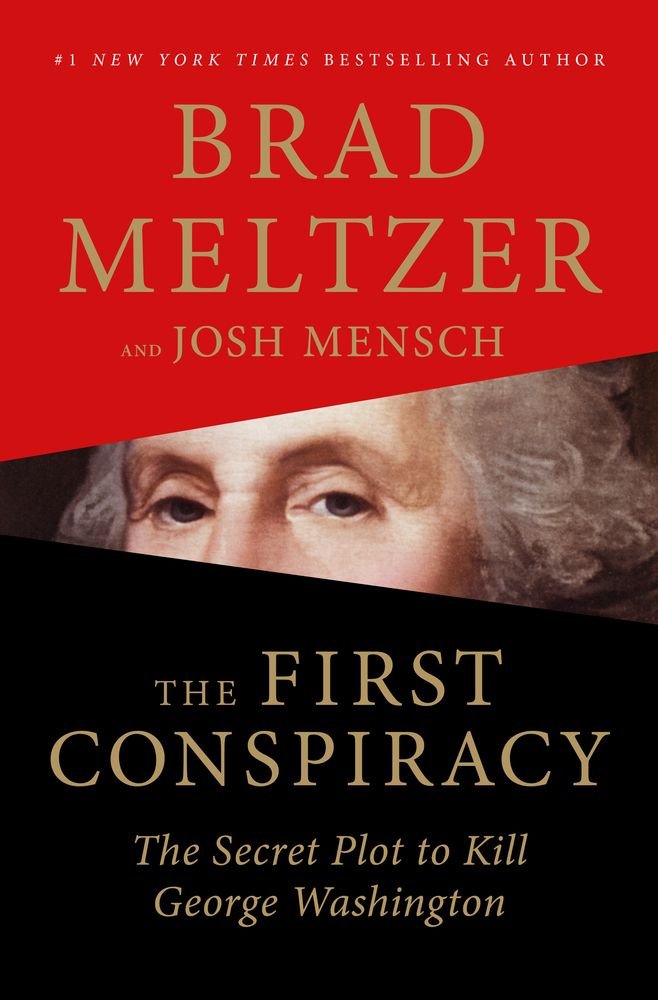Brad Meltzer has spent a career crafting thrillers about presidents, spies and Washington, DC insiders. But for the first time ever, everything he's writing is true.
The writer of novels and comics just released his first fully nonfiction book for adults. Telling the tale of an event from American history that upended the way humanity fought its wars is The First Conspiracy: The Secret Plot to Kill George Washington with coauthor John Mensch. The book expands upon the secret plot to kill the fabled founding father and how America's first president built a spy ring to defend himself and the young nation.
As Meltzer prepped to hit the road for a tour supporting the book, he spoke with CBR about the hidden piece of history about America's founding father that followed him for years and what America's violent birth tells us about society today.
CBR: So many of your novels have been built on American history, but this is your first truly non-fiction book for adult, and I understand you've had the idea for around a decade. What finally pushed you into getting this story on the page and into people's hands?
Brad Meltzer: For me it was just that I couldn't shake the idea. I found this plot to kill George Washington nearly a decade ago, and I actually put it in one of my thrillers, The President's Shadow. It's on one page as just a quick mention. But another year went by, and I was still thinking about it. Then another year went and another. And when five years go by and you're still thinking about an idea? For me, creatively that's where you have to say "It's time to do the book." And when you're a person who does a lot of research, tons of ideas come your way. But it's the ones that stick with you that really need to be watered and grown. This was just the one I couldn't shake.
RELATED: Brad Meltzer Merges War & Houdini in The Escape Artist, Preps Action #1000
It's worth mentioning that the other big thing that put me on the path was the fact that I was dying to know what happened behind this. I mean, I had to ask whether this was even real. And I talked with Pulitzer Prize-winning author Joseph Ellis who wrote one of the biggest and best George Washington biographies. And I said, "Do you know this story, and is it true?" What he said to me was, "I know the story, but it's a story that involves George Washington's spies. They were always trying to keep this story secret. You can find out through research exactly how many slaves George Washington owned, but you'll never find out who all his spies were. By its nature, what you're searching for will always be elusive. But you should try it, though." [Laughs] What he told me was at best I could get a book and worst I'd have a little adventure. That really put me on the path to making this happen.
There are a lot of pieces of history that we don't get taught when we're younger, and one of the things I learned about as an adult was how much the American Revolution had elements of what we'd now call guerrilla warfare. The Americans did not "play fair" as the British defined it.
Yeah. We're a country founded on legends and myths. It's why we love our superheroes. But the legends and myths we love more than any others are the ones about ourselves. For me, the most fascinating part is pulling apart that idea. We love to tell the story of the American side being a ragtag group that magically beat the greatest fighting force in the entire world. That's a nice story, but it's not the real story. In reality, the country was divided – perhaps more divided than it is today. The myth is that patriots were here, the British were over there, and then we fought them until they went back. But the reality was that at the time, when the biggest battles of the Revolution were taking place things were divided. Your neighbor may have been someone who was not on your side. And you couldn't know for sure.
We didn't have bullets and gunpowder most of the time. And the British were actually juts as sneaky as we were. In The First Conspiracy, you'll see that they used smallpox. At the time, it was mowing people down. They just didn't have the medicine to deal with the level of infection. And so the British would infect blankets with smallpox and drop them off in different regiments. It was the world's first biological warfare. You'll see these incredible scenes from the rebel side where you have young 20-year-old kids who said, "I think we can steal their cannons if we take them at night." It wasn't like there were cameras everywhere, so you had these young men dragging cannons that weighed as much as multiple cars from Massachusetts to New York. It's an incredible moment done by 20-year-olds that changes the course of history.
RELATED: Brad Meltzer Remakes History in Detective Comics #27
And what you see in this plot to kill George Washington is the start of what becomes counterintelligence. That word didn't come about until World War II, but make no mistake, it started in the Revolutionary War. When Washington found out about this plot against him, he immediately struck back.
It's interesting to hear you describe this story because it sounds like one of your thrillers. When it came to crafting a nonfiction book with your cowriter, how did you approach the style of the writing? Was there a way you had to work to make this feel more narrative than informational?
When I first got Green Arrow, someone in the comic book universe went back and read all my novels. No one knew who I was. I was a totally new name. But I'd written four novels. And this guy went through them all and then said, "His novels are just like comics. They're short chapters and a cliffhanger." And when I read that, I was a little shocked, but then I thought, "Of course that's how I write! All I've read since I was ten years old is comics. It's been 22 pages and a cliffhanger over and over." It was no surprise that that's how I write, and it's the same here.
I didn't set out to write this book like a comic or a novel, but it works the same way. That's just what I like. The book has cliffhangers built in. Why? Because there were a lot of cliffhangers in this story. They were trying to kill George Washington. There are moments in there where you see that plot unfold and have jailhouse witnesses snitching on each other. It feels like a thriller. I wanted this book to honor that and move. It has the same momentum of a good comic where you're on an adventure with the writer and with that hero. I've said this before, but Superman and Batman and Wonder Woman and George Washington and Abraham Lincoln are all mined from the same vein. And I realize that two of them are real and three are fictional. But they all represent something greater that we want to see in ourselves.
Brad Meltzer is on tour supporting The First Conspiracy, which you can read more about at his website.


